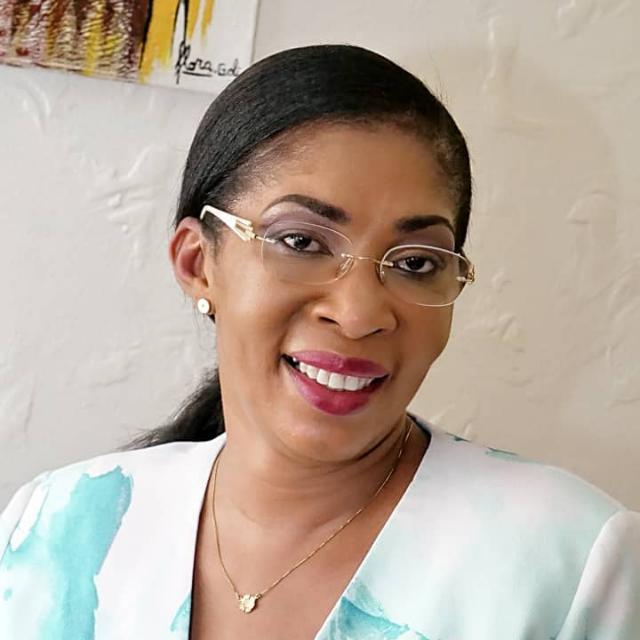 Ghana: Farida Bedwei, an engineer working for digital inclusion
Ghana: Farida Bedwei, an engineer working for digital inclusion
 Alvine Kamaha, the Cameroonian physicist with an inspiring career path
Alvine Kamaha, the Cameroonian physicist with an inspiring career path
 Ethiopia : Maheder Haileselassie Tadese, photographer of the human condition
Ethiopia : Maheder Haileselassie Tadese, photographer of the human condition
 Inemesit Dike: “My work revolves around navigating the intersection of law, innovation, and technology”
Inemesit Dike: “My work revolves around navigating the intersection of law, innovation, and technology”


Aimée-Danielle LEZOU KOFFI is a gender expert, president of “Africa Femmes Initiatives Positives” (AFIP)-Africa association and research professor at Félix Houphouët-Boigny University in Ivory Coast. On the occasion of the International Women’s Rights Day, she talks about women’s leadership in Africa, which is the theme of the 2021 edition.
What about the representation of women in governance and leadership positions in Africa?
In 2019, 16 out of 75 legislatures on the continent were headed by women.
My reaction is mixed. It is undeniable that in recent years there has been an acceleration of women’s representation at very high levels of leadership. For example, the appointment of Dr. Ngozi Okonjo-Iweala as head of the World Trade Organization (WTO). In 2019, 16 out of 75 legislatures on the continent were headed by women. In the private sector, one in four members of the boards of directors of African companies today is a woman, i.e. (25%), a rate higher than that of Europe (23%). Therefore, there is reason to express some satisfaction and rejoice at the progress made in this area. However, they are far from constituting a critical mass for achieving the gender equality objectives of the Sustainable Development Goals (SDOs) by 2030. Unfortunately, women are still under-represented at all levels of decision-making bodies (between 10% and 18% for Ivory Coast). To sum up, the lines are certainly moving, but much remains to be done.
What are the mechanisms to foster women’s leadership in Africa?
The initiatives are numerous and visible at different governmental levels and in civil society. Important talks and advocacy are being undertaken with States to put in place affirmative action policies, the implementation of which leads to the establishment of quota systems and target setting supported by a legal framework. Similarly, there are women’s leadership training programs for the accession of women to high-level positions, coaching programs for women candidates for elective positions, as well as initiatives by associations and NGOs for training in personal development and women’s leadership in order to develop self-confidence and self-esteem. These programs develop self-awareness among women who understand the value of their contribution to communities and discover themselves as true social actors.
What are the obstacles that hinder the leadership of African women today?
The fear of failure, the lack of self-confidence and self-esteem impede women to rise to high levels of leadership.
The first obstacle is intrinsically linked to the identity of African women, the way they see themselves and their role in society. First of all, the majority see themselves first and foremost as wives and mothers. Very often, these statuses seem sufficient to many women. Secondly, even when they pursue a career, their choices take these statuses into account and any external force likely to upset this balance will be rejected, often with encouragement from the environment. The fear of not being able to find a balance between professional and family life causes reluctance and holds women back. They don’t dare. The fear of failure, the lack of self-confidence and self-esteem constitute the second obstacle in the development of women and their rise to high levels of leadership. Stereotypes and other sociocultural constraints are hard to overcome. Finally, we could talk about financial resources. Campaigns for elected positions require financial means. And often, women do not have the resources and supports they need.
What are the levers to increase the presence of women in decision-making positions in Africa?
If they don’t give you a seat at the table, bring a folding chair. Shirley Chisholm
The main lever, in our opinion, is to develop women’s power to act. This expression, which one might find theoretical and which I borrow from Judith Butler, emphasizes the need, in the situation in which we find ourselves, to find the impetus to take action. In other words, I mean that African women with their specific identities, their history, their culture should be able to be women of their time who actively participate in the development of their society. Another fundamental lever concerns the involvement of boys and adult men in the promotion of gender equality in order to combat social norms. Girls’ education is also an essential lever for gender equality. Solidarity in different forms is an essential value to be promoted. Various actions help to promote it, including activities to share experiences, to value women with remarkable achievements, mentoring and networking. Finally, the power to act evolves along with the audacity to act. Shirley Chisholm aptly illustrates this in a powerful formula: “If they don’t give you a seat at the table, bring a folding chair”.
A word on the occasion of International Women’s Rights Day ?
This year’s theme: “Women’s leadership: towards an Egalitarian Future in the Covid-19 World” expresses the fear that this pandemic could undermine the gains of feminist struggles. We know that in a context of crisis, women, whose situation is already precarious, pay a heavy price. It is well known that the COVID-19 has exacerbated all the violence experienced by women: physical, psychological, economic… Gender inequalities are increasingly blatant to the detriment of women. It is becoming urgent to find the springs to resist and bounce back. Women need to develop their resilience by adopting a constructive approach: identifying their strengths; making choices that correspond to them; focusing on the positive and, finally, developing self-control. In the current context, those who are flexible and enthusiastic about the changes ahead will certainly succeed.